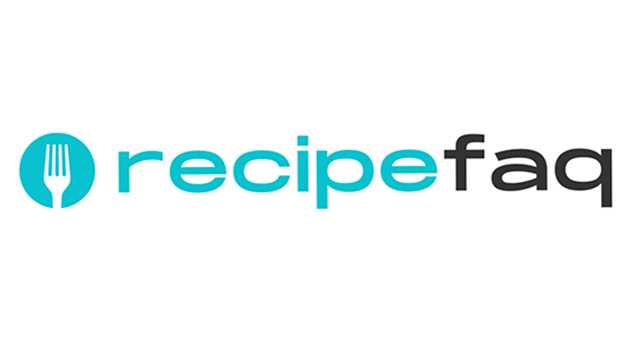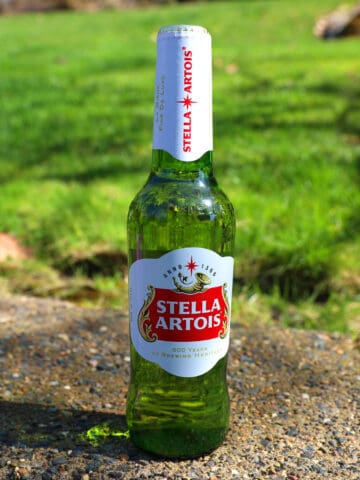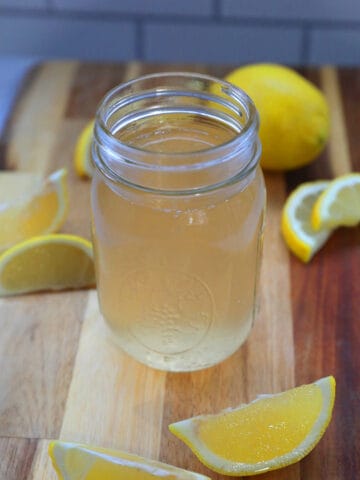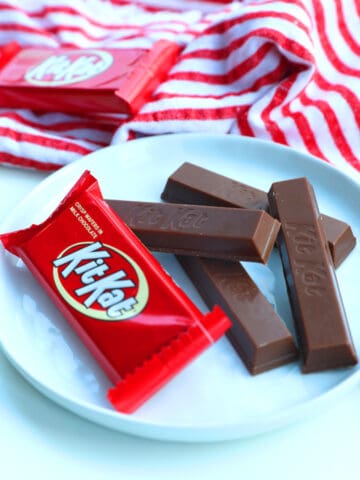This popular Dutch beer is sold worldwide and comes in both original and alcohol-free versions. But is Heineken gluten free? Or should you look for beer alternatives if you’re gluten intolerant?

It’s one of the planet’s most recognizable beer brands, and one of the most popular. In fact, Heineken’s revenue topped 20 billion Euros last year. That’s a lot of six packs!
But if you can’t have gluten, does that also mean you can’t have Heineken?
A key ingredient in Heineken is barley malt. And since barely contains gluten, technically that means the beer isn’t gluten free.
But, there’s actually a lot of controversy about this. Mostly driven by Heineken. On its own website, the brewer appears to walk a fine line on whether it considers its beer gluten free or not.
So, is it? Read on to see if their claims stand up to scrutiny.
Jump to:
What is Heineken beer?

Heineken is a pale lager beer that has been brewed for 140 years.
It originated in Amsterdam in the 19th century. Founder Gerard Heineken first opened the brewery in 1873. In just two years, the beer was winning gold medals at international beer competitions and soon was exported to other countries in Europe, most notably France.
Fast forward to 1933, and the Prohibition Era was ending in the United States. Heineken continued its growth plans by becoming the first foreign beer available in the U.S at the time.
Descendant Alfred Heineken sets the next milestone for the company by introducing both the “star” logo and the signature green brand color, both of which are still in use today.
Now Heineken produces three main styles of beer:
- Original (Heineken Pilsner – 5% alcohol by volume)
- Light (3.3% ABV)
- Heineken 0.0 (non-alcoholic beer)
The main ingredients in all of the styles are water, hops, malted barley, and yeast (called Heineken A-Yeast).
Is Heineken beer gluten-free?

I mentioned above that there’s a bit of controversy around whether Original Heineken is gluten free. For the most part, the one stirring things up is Heineken itself.
On its website, the company makes several arguments around the gluten levels in Heineken – and suggests the beer may pose no problems for many who suffer from gluten sensitivities:
1. First, Heineken appears to minimize the level of gluten in its beer by claiming that only traces of gluten actually make it into the final product once the fermentation process and brewing is complete.
2. The company also argues that the brewing process that makes beers light in color, such as Heineken, can result in lower gluten levels in the finished product.
3. Finally, it asserts that lagers like Heineken typically do not pose health issues for people with a gluten allergy.
It’s important to note that Heineken provides no scientific basis for any of these points.
But there is some validity to at least parts of them. Let’s take them in order.
1. Heineken does not offer evidence of any internal testing it has performed to show the level of gluten content in its beer. So it is hard to verify that it doesn’t have as much gluten as other traditional beers.
Though some independent tests have shown gluten levels very near or below 20 ppm (parts per million) in Heineken.
That’s the level that many health authorities say can be tolerated by those with celiac disease, an illness that can cause harmful reactions to gluten.
2. Next, the brewing process for lighter beers does tend to result in beers that have less gluten than other types. That’s because the beer is essentially more watered down.
For example, the average lager has a gluten count of 60 ppm, compared to an ale, which averages more than 3,000 ppm gluten. However, 60 ppm of gluten is still too high for anyone with gluten intolerance.
3. There is little evidence to back up Heineken’s statement that lagers pose little risk for those with gluten allergies. So whether and by how much Heineken might affect you may depend on your level of gluten sensitivity.
The bottom line
According to rules from the U.S. Food and Drug Administration, only products with gluten content levels below 20 ppm can officially be termed “gluten-free.” So if anything, Heineken might be classified as a gluten-reduced or gluten-removed beer.
Regardless, if you have Celiac disease, gluten allergies, or a sensitivity to gluten, any amount of gluten can be problematic.
Ultimately, since Heineken is brewed with malted barley as a main ingredient, it cannot be called gluten free. That’s because barley contains gluten proteins (called ‘gliadin’).
For the same reason, neither Heineken Light Beer nor the alcohol-free Heineken 0.0 can be classified as gluten-free beers, as they too are brewed with barley. Though each will have fewer calories than original Heineken.
Gluten-free beer alternatives to Heineken
While a pint of Heineken beer may not be an option for those on a gluten-free diet, the good news is that a lot of gluten-free varieties of beer — and other gluten-reduced brews — are widely available. And many are craft beer options. Popular brands include:
Gluten-free beers
- Bierly Brewing
- Glutenberg Stout
- Ghostfish Brewing Company
- New Planet
Gluten-reduced beers
Since Heineken is not technically a gluten-free beer, if you have celiac disease or are very sensitive to gluten, it may be a good idea to steer clear from it. Fortunately, there are several great gluten-free beers on the market that you can try.
If your gluten sensitivity is milder, you may be able to enjoy Heineken in moderation, due to its relatively low level of gluten.
FAQ
Keep Heineken in a dry, cool place out of direct light like a pantry. When you’re ready to drink it, move it to the fridge and let it chill for 30 minutes to an hour.
No. Heineken uses a natural brewing process. Heineken ingredients are water, hops, barley malt, and yeast.
More gluten-related answers
Learn about whether some other foods and drinks are gluten. Check out these posts.






Leave a Reply